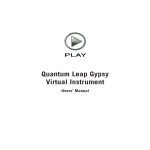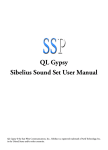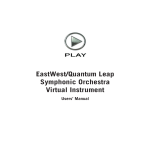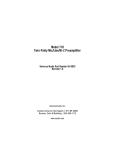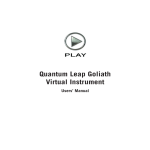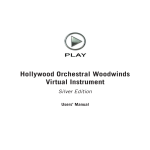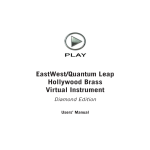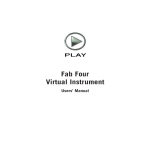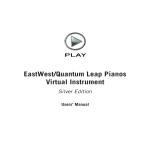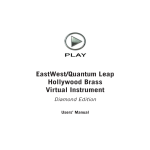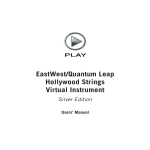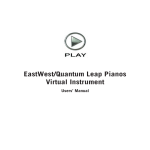Download Gypsy Manual - Soundsonline
Transcript
Quantum Leap Gypsy Virtual Instrument Users’ Manual QUANTUM LEAP GYPSY VIRTUAL INSTRUMENT The information in this document is subject to change without notice and does not represent a commitment on the part of East West Sounds, Inc. The software and sounds described in this document are subject to License Agreements and may not be copied to other media. No part of this publication may be copied, reproduced or otherwise transmitted or recorded, for any purpose, without prior written permission by East West Sounds, Inc. All product and company names are ™ or ® trademarks of their respective owners. © East West Sounds, Inc., 2007. All rights reserved. East West Sounds, Inc. 6000 Sunset Blvd. Hollywood, CA 90028 USA 1-323-957-6969 voice 1-323-957-6966 fax For questions about licensing of products: [email protected] For more general information about products: [email protected] http://support.soundsonline.com ii QUANTUM LEAP GYPSY VIRTUAL INSTRUMENT 1. Welcome 2 3 4 5 6 About EastWest Producer: Nick Phoenix Credits How to Use This and the Other Manuals Online Documentation and Other Resources Click on this text to open the Master Navigation Document 1 QUANTUM LEAP GYPSY VIRTUAL INSTRUMENT Welcome About EastWest EastWest (www.soundsonline.com) has been dedicated to perpetual innovation and uncompromising quality, setting the industry standard as the most critically acclaimed producer of Sample CDs and Virtual (software) Instruments. Founder and producer Doug Rogers has over 30 years experience in the audio industry and is the recipient of many recording industry awards including “Recording Engineer of the Year.” In 2005, “The Art of Digital Music” named him one of “56 Visionary Artists & Insiders” in the book of the same name. In 1988, he founded EastWest, the most critically acclaimed sound developer in the world, and recipient of over 50 industry awards, more than any other sound developer. His uncompromising approach to quality, and innovative ideas have enabled EastWest to lead the sound-ware business for 20 years. In 1997 Rogers partnered with producer/composer Nick Phoenix and set up Quantum Leap, a wholly owned division of EastWest, to produce high-quality, no-compromise sample libraries and virtual instruments. Quantum Leap virtual instruments are mostly produced by Nick Phoenix. Some of the larger productions, such as Symphonic Orchestra, Symphonic Choirs and Quantum Leap Pianos are co-produced by Doug Rogers and Nick Phoenix. As a composer, Phoenix began scoring film trailers and television commercials in 1994. To date, he has either scored or licensed music for the ad campaigns of over 1000 major motion pictures including Tomb Raider 2, Terminator 3, Lord of the Rings Return of the King, Harry Potter 2, Star Wars Episode 2, Spiderman 3, Pirates of the Caribbean 3, Blood Diamond, Night at the Museum, and The Da Vinci Code. Quantum Leap has now firmly established itself as one of the world’s top producers of high-end sample libraries and virtual instruments. In 2006, EastWest purchased the legendary Cello Studios (formerly United Western Recorders) on Sunset Boulevard in Hollywood, re-naming it EastWest Studios. The 21,000 sq. ft. facility, since remodelled by master designer Philippe Starck, houses five recording studios and is the world headquarters for EastWest. Chapter 1: Welcome 2 QUANTUM LEAP GYPSY VIRTUAL INSTRUMENT Producer: Nick Phoenix Born in London, England, in 1967, Nick began scoring film trailers and television commercials in 1994. To date, he has either scored or licensed music for the ad campaigns of over 1000 major motion pictures. “Spiderman 3.” “Pirates of the Caribbean 3,” “Fantastic Four, Silver Surfer,” “300,” “Sunshine,” “The Last Mimzy,” “Hannibal Rising,” “Blood Diamond,” “Night at the Museum,” “Superman Returns,” “Astronaut Farmer,” “Rush Hour 3,” “Eragon,” and “The Da Vinci Code” are a few recent examples. Nick has also scored numerous TV shows for NBC, CBS, Showtime, Fox Family, and the History Channel. The journey as a composer has also inspired Nick to record and program his own sounds and samples. Nick founded Quantum Leap Productions in 1997 and Quantum Leap has since grown to be the most critically acclaimed producer of high-end sample libraries and virtual instruments. Nick’s studio is located in Venice, California, and is 100% solar powered. Quantum Leap titles to date: • QL Guitar and Bass • QL Brass • QL 56 Strat • QL Voices of the Apocalypse • QL Rare Instruments • QL Hardcore Bass • QL Stormdrum • EWQL Symphonic Orchestra • EWQL Symphonic Orchestra XP Chapter 1: Welcome • • • • • • • • EWQL Symphonic Choirs QL Ra QL Colossus QL Gypsy QL Ministry of Rock QL Voices of Passion QL Stormdrum 2 EWQL Pianos 3 QUANTUM LEAP GYPSY VIRTUAL INSTRUMENT Credits Producer Nick Phoenix Executive Producer Doug Rogers Engineering Nick Phoenix, Rhys Moody Programming Nick Phoenix, Pierre Martin Editing Pierre Martin, Nick Phoenix Art Direction Steven Gilmore, Doug Rogers, Nick Phoenix Software Sam Fischmann, Klaus Voltmer, Patrick Stinson, Stefan Kersten, Klaus Lebkücher, Toine Diepstraten, Stefan Podell, Albert Ortega, Doug Rogers, Nick Phoenix, Rhys Moody, Stefan Leiste Musicians Guitars: David Kole, Violin: Harry Scorzo, Accordions: Bobby Carpenter Manual John Philpit Special Thanks to Shaun Ellwood, Gary Meyerberg Chapter 1: Welcome 4 QUANTUM LEAP GYPSY VIRTUAL INSTRUMENT How to Use This and the Other Manuals All documentation for the EastWest PLAY Advanced Sample System and its libraries is provided as a collection of Adobe Acrobat files, also called PDFs. They can be viewed on the computer screen or printed to paper. Each time you install one of the PLAY System libraries, two manuals are copied to the file system on your computer: • The manual that describes the whole PLAY System. This, the largest of the manuals, addresses how to install and use all aspects of the software that are common to all libraries. • The library-specific manual, such as the one you are currently reading. This smaller document describes aspects that differ from one library to the next, such as the list of included instruments and articulations. Using the Adobe Acrobat Features By opening the Bookmarks pane along the left edge of the Adobe Acrobat Reader, the user can jump directly to a topic from the section names. Note that some older versions of Acrobat Reader might not support all these features. The latest Acrobat Reader can be downloaded and installed at no cost from the Adobe web site. (As an example of a hyperlink, you can click on the last word of the previous sentence to be taken directly to the Adobe site.) When reading this and other manuals on the computer screen, you can zoom in to see more detail in the images or zoom out to see more of the page at once. If an included picture of the user interface, or a diagram, seems fuzzy or illegible, then zoom in using one of several means provided in the Acrobat Reader software. The Master Navigation Document Because the EastWest PLAY System is a collection of components, each with its own User’s Manual, a Master Navigation Document (MND) is provided to allow users to jump quickly between these PDFs when being read on the computer screen. This MND is a one-page file with hyperlinks to the PLAY System documentation and to all the library manuals. Hyperlinks to this Master Navigation Document are found on the title page of each chapter in each document. From there, you can open any other document in the collection. For example, if you’re reading something in this documentation for the Quantum Leap Gypsy library, and need to open the manual for the PLAY System as well, go to any chapter title page and click on the link that says, “Click on this text to open the Master Navigation Document.” It will open in a new window on the screen. In that document, click on the icon for the PLAY System and its manual will open in the same window (hiding the MND). You now have both the Gypsy library manual and the PLAY System manual open in separate windows so you can refer to them both. Chapter 1: Welcome 5 QUANTUM LEAP GYPSY VIRTUAL INSTRUMENT Online Documentation and Other Resources For the most up to date information, visit the support pages at EastWest’s web site. There you can find: • information made available after these manuals were written • FAQ pages that may already list answers to questions you have • suggestions from EastWest and other users of the EastWest PLAY System • news about upcoming releases The address is: http://support.soundsonline.com You can also visit the EastWest online forums. There you can read comments and questions from others who use EastWest products and post your own. The many forum participants are a good source of helpful information about both the technical and musical aspects of this software. The address of the forums is: http://www.soundsonline-forums.com Chapter 1: Welcome 6 QUANTUM LEAP GYPSY VIRTUAL INSTRUMENT 2. Quantum Leap Gypsy, An Overview 8 8 9 9 The Design Point for the Gypsy Library What’s Included Notes from the Producer Hardware Requirements Click on this text to open the Master Navigation Document 7 QUANTUM LEAP GYPSY VIRTUAL INSTRUMENT Quantum Leap Gypsy, An Overview The Design Point For the Gypsy Library The Quantum Leap Gypsy library was designed from the beginning as a collection of extremely detailed gypsy-style virtual instruments capable of playing completely realistic performances. And that vision has been realized in what is now an essential tool for film, TV, and game composers. The nylon string guitar, violin, and trombone are programmed to fit in with both gypsy and classical styles. In the classical realm, these three instruments are unparalleled in the sampling world in terms of playability, diversity, and sound quality. The violin and trombone feature a wide variety of articulations, repetitions, and even true legato intervals. All of the guitars were sampled with up and down strokes, many different velocities and picking styles, release trails, chords, and effects. The Gypsy library’s guitars sound incredibly good. They were played by one of the best session guitarists in Los Angeles, David Kole. The several different accordions feature a variety of setups, all sampled with air flow both in and out, as well as expressive samples, chords, and left hand bass. The library also includes a very cool gypsy percussion program as well as two flamenco dancers performing foot stomps and the traditional style of castanets. The Quantum Leap Gypsy Library also features a bandoneon and a cimbalom, two very rare instruments indeed. What’s Included This Quantum Leap Gypsy library you purchased includes all the following: • a complete set of sample-based instruments, enumerated later in this manual • approximately 12 Gigabytes of 24-bit, 44.1 kHz samples • the EastWest PLAY Advanced Sample Engine • the unique authorization code that identifies the license you bought • manuals in Adobe Acrobat format for both the EastWest PLAY System and the Quantum Leap Gypsy Virtual Instrument • an installation program to set up the library, software, and documentation on your computer • an Authorization Wizard for registering your license in an online database Chapter 2: Quantum Leap Gypsy, An Overview 8 QUANTUM LEAP GYPSY VIRTUAL INSTRUMENT One required item not usually included is an iLok security key. If you already have one from an earlier purchase of software, you can use it. Otherwise, you need to acquire one. They are available from many retailers that sell EastWest and Quantum Leap products, or you can buy one online at www.soundsonline.com. Notes from the Producer Instruments in Gypsy were recorded in stereo in the most realistic way possible. Channel sourcing options, panning, and stereo double in PLAY let you manipulate the stereo file. For most of the instruments, the left channel and the right channel have slight tonal differences. This is due to the way the instrument projects sound, string position, mic position etc. Accordions project the left hand notes or buttons to one side and right hand notes or buttons to the other side. The recordings reflect this and give you a really nice image when both hands are played. Some Gypsy patches load up with the Convolution Reverb enabled. This was done because these are typical setting for such instruments. You are encouraged to experiment with the fantastic reverbs in the PLAY Engine to create your own effects. Note: The high-quality Convolution Reverb in the EastWest PLAY Engine, as mentioned above, does use lots of CPU power. If your computer has the minimum system specs, turning off the reverb controls after loading a patch may significantly improve performance. Some Gypsy instruments take advantage of the PLAY Engine’s feature called Channel Sourcing. It lets you access the two sides of the stereo file independently. Use this control along with the Stereo Double knob to affect how wide a sound to generate. Some of the other PLAY System features working under the hood are used to achieve the Gypsy sound. These include: • auto legato detection • legato scripts • round robin articulations and two means for resetting the cycles • repetition detection Hardware Requirements See the Play System manual for a complete list of the Hardware and Software Requirements for installing and running any PLAY System library. In addition, the available space on the hard drive required for a full installation of Gypsy is approximately 12 GB (Gigabytes). Chapter 2: Quantum Leap Gypsy, An Overview 9 QUANTUM LEAP GYPSY VIRTUAL INSTRUMENT 3. The Quantum Leap Gypsy User Interface 12 12 12 13 13 14 Round Robin Reset Button Stereo Double Controls Filter Controls ADT Controls The Graphical Representation of the Envelope The Browser View Click on this text to open the Master Navigation Document 10 QUANTUM LEAP GYPSY VIRTUAL INSTRUMENT The Quantum Leap Gypsy User Interface Each library presents its own interface when one of its instruments is the current one, as specified in the Instruments drop-down in the upper right corner. The image at the bottom of the page provides an overview of the entire window when in Player View. Much of this interface is shared by all PLAY System libraries, and the common features are described in the PLAY System manual. The controls described here are: • Round Robin Reset • Stereo Double • Filter • ADT • the graphical representation of the Envelope Chapter 3: The Quantum Leap Gypsy User Interface 11 QUANTUM LEAP GYPSY VIRTUAL INSTRUMENT Round Robin Reset Button A round robin articulation is one in which several different samples are recorded with all parameters, such as volume, speed of attack, and so on, being essentially constant. The PLAY Engine then knows to alternate between the two or more samples during playback. The goal is to avoid what’s often called the “machine gun effect,” in which playing the same sampled note repeatedly causes the unnatural sound of consecutive notes being mechanically identical. There’s one potential problem with round robin technology, and one way to solve it is the Round Robin Reset button. The PLAY Engine remembers which sample should be played the next time the note sounds. If, for example, a round-robin patch contains two samples, A and B, and a piece uses that note 7 times, the PLAY Engine plays A B A B A B A. If the piece is played again from the beginning, the engine will play starting with B, because that’s next in order. The second rendition will be subtly different. Being able to reset all round-robin articulations to the beginning of the cycle allows for consistent playback. You can use this button to reset all round robin articulations on demand. Or use your choice of a MIDI note or MIDI control code to reset them one instrument at a time from a MIDI keyboard or the data stored in a sequencer project. See the description of the Settings dialog for more information about this articulation-specific approach. Stereo Double Controls This knob, with its three buttons, gives the user the option of using exclusively the left stereo signal or right when “Stereo” is selected from the Channel Source drop-down. For any other setting, this control has no effect. The knob lets the user determine the spread of the signals, how far apart the ear perceives the stereo channels to be. A value of 0% brings the two channels together at the center (unless the Pan knob positions the output differently), and is the equivalent of turning off the controls with the button below the knob. A value of 100% call for the maximum spread available. Select between the left and right signal with the buttons on either side of the knob. Filter Controls The Filter controls take the sound of the instrument, and modify it by filtering out some of the sound above a certain frequency. This type of effect is commonly called a Low Pass Filter. The Frequency knob determines where the sound starts to be filtered out. The Resonance knob specifies how much the filter “rings” at the dialed frequency. The higher the resonance knob is set, the more focused this ringing becomes. Chapter 3: The Quantum Leap Gypsy User Interface 12 QUANTUM LEAP GYPSY VIRTUAL INSTRUMENT The graph gives you visual cues about the frequency distribution you are creating with the settings you select. ADT Controls Artificial Double Tracking is a technique, invented at Abbey Road when the Beatles were recording there, that approximates the effect of double tracking (recording two nearly identical takes of a vocalist or instrument on the same part and laying one on top of the other) without actually taking the time to record two takes. And some would say ADT improves on actual double tracking even beyond the savings in time. The original ADT process was based on magnetic tape; in the PLAY Engine, the effect is created digitally. The software programmers, however, added a tape simulator to mimic the slight speed variations of the two analog tape machines that created the ADT effect. The Delay knob specifies in milliseconds, the delay between the original signal and the secondary signal. A delay of around 40 ms is typical, so is often a good starting point when crafting a specific effect. The Depth knob specifies the amount by which that delay is modulated. You don’t want a exactly consistent delay; the delay of the secondary signal will vary forward and backward in time by this much. The Speed knob varies the speed at which that delay is modulated. The Level knob specifies the relative loudness of the secondary signal. Set it to 0.0 dB to hear the effect at its strongest, with the same level on both signals; higher or lower gives preference to one of the signals. The overall effect depends on their combination. The On/Off button allows you to kill the ADT effect instantly and then reinstate it with the same settings, as needed. The Graphical Representation of the Envelope The Envelope Controls are described in the main PLAY System manual because they are common to all PLAY System libraries. Only some libraries include the graph, as shown here, so it is included in the manuals for those libraries only. Note that the total width of the graph represents the total length of all phases of the envelope. Therefore, when you change something in one part of the graph, for example, the decay, you may see the slopes of other components, the attack and the release, change as well because those phases become a larger or smaller percent of the whole; this is as expected. Chapter 3: The Quantum Leap Gypsy User Interface 13 QUANTUM LEAP GYPSY VIRTUAL INSTRUMENT The Browser View The Browser behaves identically among all PLAY System libraries. Read the main PLAY System manual for information about how to use that view. Chapter 3: The Quantum Leap Gypsy User Interface 14 QUANTUM LEAP GYPSY VIRTUAL INSTRUMENT 4. Instruments, Articulations, Keyswitches 16 18 18 25 Descriptions of the Gypsy Instruments Explaining the Instrument Sub-types A Table of the Instruments Abbreviations Used in Articulation Names Click on this text to open the Master Navigation Document 15 QUANTUM LEAP GYPSY VIRTUAL INSTRUMENT Instruments, Articulations, Keyswitches This chapter provides specific information about each of the instruments in the Gypsy library. First is a section that briefly describes them in case some are unfamiliar to you. This is followed by a table that lists for each instrument the available articulations together with the keyswitch note that initiates each one. You might want to print out the pages containing this table as a reference. Descriptions of the Gypsy Instruments This is a list of all the instruments in the Gypsy library. Each item includes a brief description of the physical instrument (or person in the case of the Flamenco Dancer) and some information about the sounds it can make. See the table later in this manual for specifics about what articulations are available. Bandoneon This is a button accordion derived from the German Koncertina. The bandoneon was developed in Germany and was later used in Argentina, where it became the symbol of Tango. The bandoneon has left-hand and right-hand buttons, but no keyboard. When playing the bandoneon in the Gypsy library, you can hear the change in tone when transitioning from the left-hand to the right-hand samples. Overlap of range between these two sets of buttons is one octave. The bandoneon is a very expressive accordion and it is also good at faster performances. Experiment with the various articulations. The bandoneon can be played at only a single tonal setting. Campana Accordion An Italian version of the accordion, it has 3 settings: single reed, double reed, and musette. Samples were recorded with airflow in both directions: in and out. The keyswitch controls this variation, as well as left hand choices of single note, octave, major chord, minor chord, 7th chord. Cimbalom This is an Eastern European large hammer dulcimer with a 5-octave range and tight, piano-like strings. There are 5 velocities with round robin auto-alternation, as well as double-strikes and tremolos. The cimbalom is capable of ghostly soft dynamics and brighter, more focused loud notes. While a typical gypsy instrument, it is also a fantastic film-score element. Chapter 4: Instruments, Articulations, Keyswitches 16 QUANTUM LEAP GYPSY VIRTUAL INSTRUMENT Classical Guitar A nylon string concert guitar. It is suitable for mellower flamenco or Spanish music, but primarily it’s the best sounding classical concert guitar instrument we’ve heard. The samples include a non-vibrato round robin articulation, as well as subtle vibrato, hammer-ons, and harmonics. Django Guitar A hollow-body jazz guitar played in the Django Reinhardt style, this instrument has lots of jazz chords as well as a lead articulation. Excelsior Accordion This Italian accordion includes 3 settings: single, full, and hi musette. Samples were recorded with airflow in both directions: in and out. The keyswitch controls this variation as well as left hand choices of single note, octave, major chord, minor chord, 7th chord. Flamenco Dancer These are samples of foot stomps, various traditional techniques, and castanets. There’s lots of variation to enhance the realism, plus alternate stomps. The castanet includes a variety of techniques. Flamenco Guitar This is a nylon string flamenco guitar with both a lead articulation and chords. By using the lead and chord master keyswitches, realistic flamenco guitar can be played. 5 velocities with round robin alternation. Gypsy Percussion This portable rhythm section includes a bass, snare drum, washboard, tambourine, cymbals, and assorted yells. Silvestri Accordion An American accordion with 2 settings: single reed and full with musette. Samples were recorded with airflow in both directions: in and out. The keyswitch controls this variation as well as left hand choices of single note, octave, major chord, minor chord, 7th chord. Spanish Steel Guitar This Spanish-made steel string guitar is a great all-purpose acoustic with real picking variations and various bends. Trombone This slide trombone is capable of classical as well as jazz and gypsy styles. It includes various articulations as well as real slide trombone legato intervals. Chapter 4: Instruments, Articulations, Keyswitches 17 QUANTUM LEAP GYPSY VIRTUAL INSTRUMENT Violin This solo violin is capable of classical as well as jazz, gypsy, and tango styles. It includes 26 articulations as well as 2 types of real legato intervals. Explaining the Instrument Sub-types For some instruments in Gypsy, there may be two or more .ewi files listed in the Browser View. Examples are Django Chords.ewi and Django Lead Master.ewi both listed under Django Guitar. Here is an explanation of what the various sub-types in the instrument name mean. Master includes a keyswitch containing all articulations of the instrument except legato intervals. Once a Master patch is opened, all articulations as well as the keyswitch notes that trigger them can be found in the Articulations control near the bottom-right hand corner of the Player View. Articulations can be freely loaded or unloaded as needed. Elements is the same as Master except that only the default articulation, usually the one at the top of the list, is loaded and active when first opened. You can load and activate different articulations as needed. There is no keyswitch, which means it’s not easy to switch to a different articulation in the middle of a performance. Instead, use an Elements patch when you need only a single articulation—or a consistent layering of multiple articulations—during the entire performance. Lead Master includes a keyswitch containing all the solo articulations of the instrument except for the legato intervals. Chords Master includes a keyswitch containing all the chordal variations of the instrument. Legato MOD is a true legato interval instrument. Playing connected legato results in true legato interval performance. The Mod Wheel allows a player to cancel legato mode in specific places by pushing the Mod Wheel all the way up. In Gypsy’s Violin, the Mod Wheel also controls the legato speed and style. A Table of the Instruments The following table lists all the articulations available in each instrument (.ewi file). As is mentioned in the previous section on Instrument Sub-types, there may be more than one instrument file for some physical instruments. Note that when an articulation is listed over a range, such as “C0-F#0,” that means the samples are layered into every sample. The relative loudness of this layer to the main samples can be controlled with the volume sliders in the Articulations control. For example key clicks and other mechanical sounds naturally heard when the instrument is Chapter 4: Instruments, Articulations, Keyswitches 18 QUANTUM LEAP GYPSY VIRTUAL INSTRUMENT played can be raised or lowered in volume without adjusting the dynamics of the musical sounds. Gypsy Instruments Keyswitch Notes Articulations Bandoneon: > Bandoneon - Master C0 Sus C#0 Sforzando D0 Portato D#0 Short E0 Crescendo F0 Sus accent 1 F0 F#0 Sus accent 2 F#0 > Bandoneon DXF single articulation Campana Accordion: > Campana Double Reed C0 Air out LH full C#0 Air out LH octave D0 Air out LH single D#0 Air in LH single E0 Air out LH major F0 Air out LH minor F#0 Air out LH 7th C0-F#0 Clicks velocity > Campana Musette C0 Air out LH full C#0 Air out LH octave D0 Air out LH single D#0 Air in LH single E0 Air out LH major F0 Air out LH minor F#0 Air out LH 7th C0-F#0 Clicks velocity continued Chapter 4: Instruments, Articulations, Keyswitches 19 QUANTUM LEAP GYPSY VIRTUAL INSTRUMENT Gypsy Instruments Keyswitch Notes Articulations > Campana Single Reed C0 Air out LH full C#0 Air out LH octave D0 Air out LH single D#0 Air in LH single E0 Air out LH major F0 Air out LH minor F#0 Air out LH 7th C0-F#0 Clicks Velocity Cimbalom: > Cimbalom - Master C0 Sus RR C#0 Double D0 Tremolo Release Trails Classical Guitar: > Classical Guitar - Master C0 Sus Nv RR C#0 Sus Vb RR D0 Leg RR D#0 Harmonics Django Guitar: > Django Guitar – Chords C0 Maj C#0 Min D0 7th D#0 9th E0 Dim 7 F0 6th F#0 Min 7 G0 Maj 7 G#0 7b5 Mute Strum continued Chapter 4: Instruments, Articulations, Keyswitches 20 QUANTUM LEAP GYPSY VIRTUAL INSTRUMENT Gypsy Instruments Keyswitch Notes Articulations > Django Guitar – Lead Master C0 Short Lead C#0 Long Lead Noises Excelsior Accordion: > Excelsior Full Reed C0 Air out LH full C#0 Air in LH octave D0 Air out LH single D#0 Air in LH single E0 Air out LH major F0 Air out LH minor F#0 Air out LH 7th C0-F#0 Key Clicks > Excelsior Hi Musette C0 Air out LH full C#0 Air in LH octave D0 Air out LH single D#0 Air in LH single E0 Air out LH major F0 Air out LH F#0 Air out LH 7th C0-F#0 Key Clicks > Excelsior Single Reed C0 Air out LH full C#0 Air in LH octave D0 Air out LH single D#0 Air in LH single E0 Air out LH major F0 Air out LH minor F#0 Air out LH 7th C0-F#0 Key Clicks continued Chapter 4: Instruments, Articulations, Keyswitches 21 QUANTUM LEAP GYPSY VIRTUAL INSTRUMENT Gypsy Instruments Keyswitch Notes Articulations Flamenco Dancer: > Castanets single articulation > Seniorita 1 single articulation > Seniorita 2 single articulation Flamenco Guitar: > Flam Chords Master C0 Fast combo Maj C#0 Fast combo Min D0 Arps rolls Maj D#0 Arps rolls Min E0 Trem Maj F0 Trem Min F#0 Rolls short RRx4 Maj G0 Rolls short RRx4 Min G#0 Doubles Triples Maj A0 Doubles Triples Min A#0 Finger Sus Maj B0 Finger Sus Min C1 Sus vs Maj C#1 Sus vs Min D1 Perf Stac Maj D#1 Perf Stac Min > Flam Lead Master C0 Sus RR C#0 Sus RR Bridge D0 Sus RR Tremolo D#0 taps C0-D0 Release RR continued Chapter 4: Instruments, Articulations, Keyswitches 22 QUANTUM LEAP GYPSY VIRTUAL INSTRUMENT Gypsy Instruments Keyswitch Notes Articulations Gypsy Percussion: > Gypsy Percussion single articulation Silvestri Accordion: > Silvestri Full Musette C0 Air out LH Full C#0 Air in LH octave D0 Air out LH major D#0 Air out LH minor E0 Air out LH 7th C0-E0 Key Clicks > Silvestri Single Reed C0 Air out LH full C#0 Air LH Octave D0 Air out LH major D#0 Air out LH minor E0 Air out LH 7th C0-E0 Key Clicks Spanish Steel Guitar > Spanish Stl Master C0 Sus RR C#0 Strum RR D0 Strum Fast RR D#0 ½ Step Slide Vib E0 Whole step slide Vib F0 ½ Step Slide Up Leg F#0 ½ Step Slide Dn Leg G0 Stac Mute Pop G#0 Stac A0 Harmonics A#0 Legato Sus B0 Noises C1 Neck Slides continued Chapter 4: Instruments, Articulations, Keyswitches 23 QUANTUM LEAP GYPSY VIRTUAL INSTRUMENT Gypsy Instruments Keyswitch Notes Articulations C#1 Pitchless Chugs D1 Taps C0-D0 Release RR MOD Trombone: > Trombone Legato MOD Legato Sus MOD Marcato > Trombone Master C0 Sus C#0 Sus Farty D0 Stac RR D#0 Stac E0 Marc RR F0 Diminuendo F#0 Sforzando G0 Crescendo Violin > Violin Legato MOD special case using the Mod Wheel; see note after table * > Violin Legato FAST MOD special case using the Mod Wheel; see note after table ** > Violin Master C0 Sus Vb C0 Sus Vb Leg C#0 Sus Vb 2 C#0 Sub Vb 2 Leg D0 Sus Vb 3 D0 Sus Vb 3 Leg D#0 Passionato D#0 Passionato Leg E0 Expressive Leg continued Chapter 4: Instruments, Articulations, Keyswitches 24 QUANTUM LEAP GYPSY VIRTUAL INSTRUMENT Gypsy Instruments Keyswitch Notes Articulations F0 Expressive slow E0 Expressive F#0 Sus Vib Accent RR G0 Sus Vib Sforzando G#0 Sul Tasto Vib G#0 Sul Tasto Vib Leg A0 Sul Tasto Expressive A#0 Sus Accent NV B0 SUS NV Sforzando C1 Sus NV Smooth C1 Sus NV Smooth Leg C#1 Martele RR 1 D1 Martele RR 2 D#1 Spiccato RR 1 E1 Spiccato 2 RR F1 Spiccato Long RR F#1 Spiccato Long 2 RR G1 Left Hand Gypsy Pizz G#1 Repetitions A1 Harmonics A#1 Ponticello A#1 Ponticello Leg B1 Bounce * Violin Legato MOD is an instrument that uses the Mod Wheel and “legato-detection” to play different samples. There are 4 articulations selected as follows: • Non-connected: When the notes are not close enough in time to be considered legato, this articulation is played. Otherwise, one of the following is played. • Legato: When the Mod Wheel is in the down position, between 0 and 24, this articulation is played. • Legato Portamento: In the middle position, 25–100, this articulation sounds. • Expressive QLegato: Plays when the Mid Wheel is pushed up, between 101–127. ** Violin Legato FAST MOD is an instrument that uses the Mod Wheel and “legatodetection” to play different samples. There are 4 articulations selected as follows: • Non-connected: When the notes are not close enough in time to be considered legato, this articulation is played. Otherwise, one of the following is played. Chapter 4: Instruments, Articulations, Keyswitches 25 QUANTUM LEAP GYPSY VIRTUAL INSTRUMENT • Legato: When the Mod Wheel is in the down position, between 0 and 24, this articulation is played. • Legato Portamento: In the middle position, 25–100, this articulation sounds. • Fast Sus VS: Plays when the Mid Wheel is pushed up, between 101–127. Abbreviations Used in Articulation Names The names of articulations are often shortened to fit in the Articulations list in the Player View. The following table provides a way to look up any unfamiliar abbreviations until you become familiar with the shortcuts. You will find that there is a lot of overlap among the libraries, because most of these are standard musical terms. Abbreviations in Articulation Names Abbreviations Full Words Dim Diminished Dn Down DXF Dynamic Cross-Fade (see note below) Leg Legato LH Left hand Maj Major Marc Marcato Min Minor MOD Controlled by Mod Wheel NV Non-vibrato Perf Perfect Pizz Pizzicato RH Right hand RR Round robin of 2 samples RRx# Round robin of # samples Stac Staccato Sus Sustain Trem Tremolo Vib Vibrato VS Vibrato Switch (high velocity = vibrato) A Dynamic Cross-Fade is an articulation that contains two or more sets of samples, recorded at different volumes, using the Mod Wheel (CC1) to vary to volume of the playback. You can use the Mod Wheel (or a CC1 envelope in a sequencer) to make swells and other mid-note and continuous adjustments to the output. Chapter 4: Instruments, Articulations, Keyswitches 26 EASTWEST END USER LICENSE AGREEMENT EASTWEST SOUNDS, INC. END USER LICENSE AGREEMENT THE EASTWEST SOUNDS, INC. END USER LICENSE AGREEMENT GOVERNS THE USE OF EASTWEST, EASTWEST/QUANTUM LEAP, AND QUANTUM LEAP SOFTWARE, AUDIO CONTENT, AND OTHER INTELLECTUAL PROPERTY PROVIDED BY EASTWEST TO THE END USER. PLEASE READ THIS LICENSE AGREEMENT (“LICENSE”) CAREFULLY BEFORE USING THE EASTWEST SOFTWARE, AUDIO CONTENT, AND OTHER INTELLECTUAL PROPERTY, AS IT GOVERNS THE TERMS AND CONDITIONS OF YOUR USE. BY USING THE EASTWEST SOFTWARE, AUDIO CONTENT, OR OTHER INTELLECTUAL PROPERTY, YOU ARE AGREEING TO BE BOUND BY THE TERMS OF THIS LICENSE. IF YOU DO NOT AGREE TO THE TERMS OF THIS LICENSE, DO NOT USE THE EASTWEST SOFTWARE, AUDIO CONTENT, OR OTHER INTELLECTUAL PROPERTY. IF YOU DO NOT AGREE TO THE TERMS OF THE LICENSE, YOU MAY RETURN THE EASTWEST SOFTWARE, AUDIO CONTENT, AND INTELLECTUAL PROPERTY TO THE PLACE WHERE YOU OBTAINED IT FOR A REFUND. YOU MUST RETURN THE ENTIRE PACKAGE IN ORDER TO OBTAIN A REFUND. IF THE EASTWEST SOFTWARE, AUDIO CONTENT, OR INTELLECTUAL PROPERTY WERE ACCESSED ELECTRONICALLY AND YOU DO NOT AGREE TO THE LICENSE, SIMPLY CLICK “DECLINE”. IMPORTANT NOTE: The software, audio content, and other intellectual property provided by EastWest to you may be used by you to create your own original works pursuant to the terms and conditions of this License. You may not use, distribute, or broadcast any of the software, audio content, or other intellectual property in any manner not expressly permitted by this License. If you are uncertain about your rights to use the software, audio content, or other intellectual property, you should contact your legal advisor before proceeding. 1. General. The EASTWEST SOFTWARE (without limit, the software, scripts, audio content, audio loops, sound files, samples, impulse responses, audio processing tools, images, formulas, designs, inventions, works, documentation, fonts, and other intellectual property whether on disk, in read only memory, on any other media or in any other form) provided to you is licensed, not sold, to you by EAST WEST SOUNDS, Inc. (“EASTWEST”) for use only under the terms of this License, and EASTWEST reserves all rights not expressly granted to you. You own the media on which EASTWEST SOFTWARE is recorded but EASTWEST and/or EASTWEST’s licensor(s) retain ownership of the EASTWEST SOFTWARE itself. The terms of this License will govern any EASTWEST SOFTWARE upgrades provided by EASTWEST that replace and/or supplement the original EASTWEST SOFTWARE, unless such upgrade is accompanied by a separate license, in which case the terms of that license will govern. Title and intellectual property rights in and to any content displayed by or accessed through the EASTWEST SOFTWARE belongs to the respective content owner. Such content may be protected by copyright or other intellectual property laws and treaties, and may be subject to terms of use of the third party providing such content. License Agreement License: 1 EASTWEST END USER LICENSE AGREEMENT 2. Permitted License Uses and Restrictions. You are granted a limited non-exclusive license to use the EASTWEST SOFTARE as follows, subject to all other terms and conditions of this License: A. You may install and use one copy of the EASTWEST SOFTWARE on one computer. You will be required to purchase, authorize and use a Pace iLok security key (not included) or other security protection EASTWEST includes to access the EASTWEST SOFTWARE. You may not make the EASTWEST SOFTWARE available over a network where it could be used by multiple computers or users at the same time. You may make one copy of the EASTWEST SOFTWARE in machine-readable form for backup purposes only; provided that the backup copy must include all copyright or other proprietary notices contained on the original. B. You may use the EASTWEST SOFTWARE to create your own original music compositions or soundtracks for your film, video, music, and audio projects, and you may broadcast and/or distribute your own original music compositions or soundtracks that were created using EASTWEST SOFTWARE. C. You may not use the EASTWEST SOFTWARE to create sounds or other content for any kind of synthesizer, virtual instrument, sample library, sample-based product, musical instrument, or competitive product. You may not license, sell, or distribute (commercially or otherwise) either the EASTWEST SOFTWARE or any portion or component parts of the EASTWEST SOFTWARE on a standalone basis or repackage and sell, license, or distribute either the EASTWEST SOFTWARE or any portion or component parts of the EASTWEST SOFTWARE on a standalone basis. D. You may use the EASTWEST SOFTWARE to compose original music compositions or soundtracks; or for a Production Music Library, also known as stock music or library music (original compositions or soundtracks created entirely by you using the EASTWEST SOFTWARE that you, in turn, license as an original composition or soundtrack to third parties for use in film, television, radio, or other media), provided the completed composition or soundtrack is created solely by you. E. You may use any included EASTWEST SOFTWARE Audio Loops (compositions that contain a combination of sound samples that can be repeated to form a continuous piece of music) for a Production Music Library, also known as stock music or library music (original compositions or soundtracks created entirely by you using the EASTWEST SOFTWARE that you, in turn, license as an original composition or soundtrack to third parties for use in film, television, radio, or other media), subject to the following terms and conditions: (1) the Audio Loops must be used in a musical context with at least two other instruments that contribute significantly to the composition; and (2) The entire Audio Loop cannot be left exposed at any time in the composition. If you have any doubt a composition or soundtrack by you meets the foregoing criteria, you may submit the composition to [email protected] for written approval. Please do not send audio or MP3 files, send us a link to your composition on your web server. License Agreement License: 2 EASTWEST END USER LICENSE AGREEMENT F. You may not, and you agree not to, or to enable others to, copy (except as and only to the extent permitted in this License), decompile, reverse engineer, disassemble, attempt to derive the source code of, decrypt, modify, or create derivative works of the EASTWEST SOFTWARE or any part thereof (except as and only to the extent any foregoing restriction is prohibited by applicable law). 3. Transfer Restriction: A right to use the EASTWEST SOFTWARE is granted to the original end-user of the product (Licensee) and is NOT transferable. You may not rent, lease, lend, sell, redistribute or sublicense the EASTWEST SOFTWARE. Updates and Upgrades: If an EASTWEST SOFTWARE update completely replaces (full install) a previously licensed version of the EASTWEST SOFTWARE, you may not use both versions of the EASTWEST SOFTWARE at the same time nor may you transfer them separately. Not for Resale (NFR) Copies: Notwithstanding other sections of this License, EASTWEST SOFTWARE labeled or otherwise provided to you for development or on a promotional basis may only be used for development, demonstration, testing and evaluation purposes and may NOT be used for any revenue generating activity that includes the use of the EASTWEST SOFTWARE without the written consent of EASTWEST. If you are not sure which license type you own (LICENSE / NFR), please check your iLok or other identified security account or contact [email protected]. Educational Copies: You must be an Eligible Educational End User to use the EASTWEST SOFTWARE. “Eligible Educational End Users” means students, faculty, staff and administration attending and/or working at an educational institutional facility (i.e., college campus, public or private K-12 schools). EASTWEST SOFTWARE provided for this purpose may NOT be used for any revenue generating activity that includes the use of the EASTWEST SOFTWARE without the written consent of EASTWEST. 4. Consent to Use of Data. You agree that EASTWEST and its subsidiaries may collect and use technical and related information, including but not limited to technical information about your computer, system and application software, and peripherals, that is gathered periodically to facilitate the provision of software updates, security, product support and other services to you (if any) related to the EASTWEST SOFTWARE, and to verify compliance with the terms of this License. EASTWEST may use this information, as long as it is in a form that does not personally identify you, to improve our products or to provide services or technologies to you. 5. Termination. This License is effective until terminated. Your rights under this License will terminate automatically without notice from EASTWEST if you fail to comply with any term(s) of this License. Upon the termination of this License, you shall cease all use of the EASTWEST SOFTWARE and destroy all copies, full or partial, of the EASTWEST SOFTWARE. 6. Limited Warranty on Media. EASTWEST warrants the media on which the EASTWEST SOFTWARE is recorded and delivered by EASTWEST to be free from defects in materials License Agreement License: 3 EASTWEST END USER LICENSE AGREEMENT and workmanship under normal use for a period of ninety (90) days from the date of the original purchase. Your exclusive remedy under this Section shall be, at EASTWEST’s option, a refund of the purchase price of the product containing the EASTWEST SOFTWARE or replacement of the EASTWEST SOFTWARE that is returned to EASTWEST or an EASTWEST authorized representative with a copy of the original receipt. THIS LIMITED WARRANTY AND ANY IMPLIED WARRANTIES ON THE MEDIA INCLUDING, BUT NOT LIMITED TO, THE IMPLIED WARRANTIES OF MERCHANTABILITY, OF SATISFACTORY QUALITY, AND OF FITNESS FOR A PARTICULAR PURPOSE, ARE LIMITED IN DURATION TO NINETY (90) DAYS FROM THE DATE OF ORIGINAL PURCHASE. SOME JURISDICTIONS DO NOT ALLOW LIMITATIONS ON HOW LONG AN IMPLIED WARRANTY LASTS, SO THE ABOVE LIMITATION MAY NOT APPLY TO YOU. THE LIMITED WARRANTY SET FORTH HEREIN IS THE ONLY WARRANTY MADE TO YOU AND IS PROVIDED IN LIEU OF ANY OTHER WARRANTIES (IF ANY) CREATED BY ANY DOCUMENTATION OR PACKAGING. THIS LIMITED WARRANTY GIVES YOU SPECIFIC LEGAL RIGHTS, AND YOU MAY ALSO HAVE OTHER RIGHTS THAT VARY BY JURISDICTION. 7. Disclaimer of Warranties. YOU EXPRESSLY ACKNOWLEDGE AND AGREE THAT, TO THE EXTENT PERMITTED BY APPLICABLE LAW, USE OF THE EASTWEST SOFTWARE IS AT YOUR SOLE RISK AND THAT THE ENTIRE RISK AS TO SATISFACTORY QUALITY, PERFORMANCE, ACCURACY AND EFFORT IS WITH YOU. EXCEPT FOR THE LIMITED WARRANTY ON MEDIA SET FORTH ABOVE AND TO THE MAXIMUM EXTENT PERMITTED BY APPLICABLE LAW, THE EASTWEST SOFTWARE IS PROVIDED “AS IS”, WITH ALL FAULTS AND WITHOUT WARRANTY OF ANY KIND, AND EASTWEST AND EASTWEST’S LICENSORS (COLLECTIVELY REFERRED TO AS “EASTWEST” FOR THE PURPOSES OF SECTIONS 7 AND 8) HEREBY DISCLAIM ALL WARRANTIES AND CONDITIONS WITH RESPECT TO THE EASTWEST SOFTWARE, EITHER EXPRESS, IMPLIED OR STATUTORY, INCLUDING, BUT NOT LIMITED TO, THE IMPLIED WARRANTIES AND/OR CONDITIONS OF MERCHANTABILITY, OF SATISFACTORY QUALITY, OF FITNESS FOR A PARTICULAR PURPOSE, OF ACCURACY, OF QUIET ENJOYMENT, AND NON-INFRINGEMENT OF THIRD PARTY RIGHTS. EASTWEST DOES NOT WARRANT AGAINST INTERFERENCE WITH YOUR ENJOYMENT OF THE EASTWEST SOFTWARE, THAT THE FUNCTIONS CONTAINED IN THE EASTWEST SOFTWARE WILL MEET YOUR REQUIREMENTS, THAT THE OPERATION OF THE EASTWEST SOFTWARE WILL BE UNINTERRUPTED OR ERROR-FREE, OR THAT DEFECTS IN THE EASTWEST SOFTWARE WILL BE CORRECTED. YOU FURTHER ACKNOWLEDGE THAT THE EASTWEST SOFTWARE IS NOT INTENDED OR SUITABLE FOR USE IN SITUATIONS OR ENVIRONMENTS WHERE THE FAILURE OF, OR ERRORS OR INACCURACIES IN THE CONTENT, DATA OR INFORMATION PROVIDED BY THE EASTWEST SOFTWARE COULD LEAD TO DEATH, PERSONAL INJURY, OR SEVERE PHYSICAL OR ENVIRONMENTAL DAMAGE, INCLUDING WITHOUT LIMITATION THE OPERATION OF NUCLEAR FACILITIES, AIRCRAFT NAVIGATION OR COMMUNICATION SYSTEMS, AIR TRAFFIC CONTROL, LIFE SUPPORT OR WEAPONS SYSTEMS. NO ORAL OR WRITTEN INFORMATION OR ADVICE GIVEN BY EASTWEST OR AN EASTWEST AUTHORIZED REPRESENTATIVE SHALL CREATE A WARRANTY. SHOULD THE EASTWEST SOFTWARE PROVE DEFECTIVE, YOU ASSUME THE ENTIRE COST OF ALL NECESSARY SERVICING, REPAIR OR CORRECTION. SOME JURISDICTIONS DO NOT ALLOW THE EXCLUSION OF IMPLIED License Agreement License: 4 EASTWEST END USER LICENSE AGREEMENT WARRANTIES OR LIMITATIONS ON APPLICABLE STATUTORY RIGHTS OF A CONSUMER, SO THE ABOVE EXCLUSION AND LIMITATIONS MAY NOT APPLY TO YOU. 8. Limitation of Liability. TO THE EXTENT NOT PROHIBITED BY LAW, IN NO EVENT SHALL EASTWEST BE LIABLE FOR PERSONAL INJURY, OR ANY INCIDENTAL, SPECIAL, INDIRECT OR CONSEQUENTIAL DAMAGES WHATSOEVER, INCLUDING, WITHOUT LIMITATION, DAMAGES FOR LOSS OF PROFITS, LOSS OF DATA, BUSINESS INTERRUPTION OR ANY OTHER COMMERCIAL DAMAGES OR LOSSES, ARISING OUT OF OR RELATED TO YOUR USE OR INABILITY TO USE THE EASTWEST SOFTWARE, HOWEVER CAUSED, REGARDLESS OF THE THEORY OF LIABILITY (CONTRACT, TORT OR OTHERWISE) AND EVEN IF EASTWEST HAS BEEN ADVISED OF THE POSSIBILITY OF SUCH DAMAGES. SOME JURISDICTIONS DO NOT ALLOW THE LIMITATION OF LIABILITY FOR PERSONAL INJURY, OR OF INCIDENTAL OR CONSEQUENTIAL DAMAGES, SO THIS LIMITATION MAY NOT APPLY TO YOU. In no event shall EASTWEST’s total liability to you for all damages (other than as may be required by applicable law in cases involving personal injury) exceed the amount of fifty dollars ($50.00). The foregoing limitations will apply even if the above stated remedy fails of its essential purpose. 9. Export Control. You may not use or otherwise export or reexport the EASTWEST SOFTWARE except as authorized by United States law and the laws of the jurisdiction in which the EASTWEST SOFTWARE was obtained. In particular, but without limitation, the EASTWEST SOFTWARE may not be exported or reexported (a) into any U.S. embargoed countries or (b) to anyone on the U.S. Treasury Department’s list of Specially Designated Nationals or the U.S. Department of Commerce Denied Person’s List or Entity List. By using the EASTWEST SOFTWARE, you represent and warrant that you are not located in any such country or on any such list. You also agree that you will not use the EASTWEST SOFTWARE or any purposes prohibited by United States law, including, without limitation, the development, design, manufacture or production of missiles, nuclear, chemical or biological weapons. 10. Government End Users. The EASTWEST SOFTWARE and related documentation are “Commercial Items”, as that term is defined at 48 C.F.R. §2.101, consisting of “Commercial Computer Software” and “Commercial Computer Software Documentation”, as such terms are used in 48 C.F.R. §12.212 or 48 C.F.R. §227.7202, as applicable. Consistent with 48 C.F.R. §12.212 or 48 C.F.R. §227.7202-1 through 227.7202-4, as applicable, the Commercial Computer Software and Commercial Computer Software Documentation are being licensed to U.S. Government end users (a) only as Commercial Items and (b) with only those rights as are granted to all other end users pursuant to the terms and conditions herein. Unpublished-rights reserved under the copyright laws of the United States. 11. Controlling Law and Severability. This License will be governed by and construed in accordance with the laws of the State of California, as applied to agreements entered into and to be performed entirely within California between California residents. This License shall not be governed by the United Nations Convention on Contracts for the International Sale of Goods, the application of which is expressly excluded. If for any License Agreement License: 5 EASTWEST END USER LICENSE AGREEMENT reason a court of competent jurisdiction finds any provision, or portion thereof, to be unenforceable, the remainder of this License shall continue in full force and effect. 12. Complete Agreement; Governing Language. This License constitutes the entire agreement between the parties with respect to the use of the EASTWEST SOFTWARE licensed hereunder and supersedes all prior or contemporaneous understandings regarding such subject matter. No amendment to or modification of this License will be binding unless in writing and signed by EASTWEST. Any translation of this License is done for local requirements and in the event of a dispute between the English and any non-English versions, the English version of this License shall govern. 13. Third Party Software and Service Terms and Conditions. Portions of the EASTWEST SOFTWARE utilize or include third party software and other copyrighted material. Acknowledgements, licensing terms and disclaimers for such material are contained in the “online” electronic documentation for the EASTWEST SOFTWARE, and your use of such material is governed by their respective terms. License Agreement License: 6


































